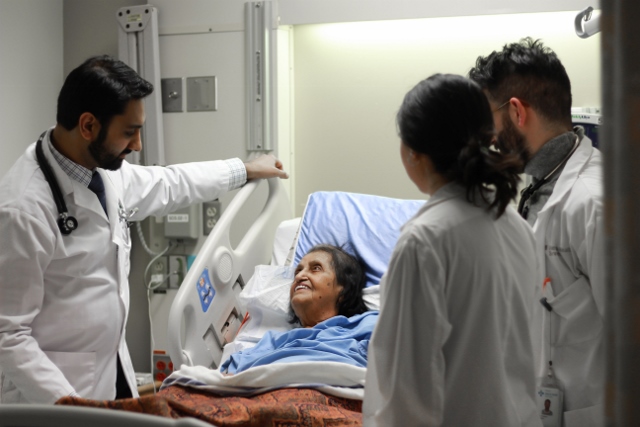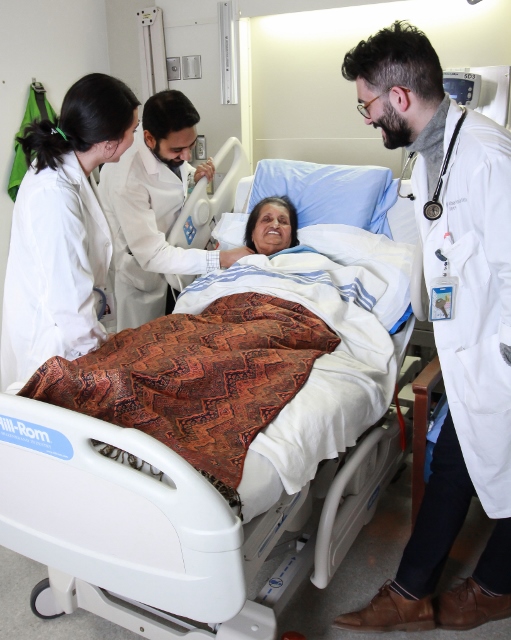
Vijay Daniels, Director of Clinical Assessment for the Faculty of Medicine & Dentistry (FoMD), is the 2018 recipient of the Clinical Teaching Award from the Association of Faculties of Medicine of Canada (AFMC) for his outstanding bedside teaching.
Vijay Daniels, associate professor in the Department of Medicine, dreamed of becoming a teacher ever since he was a student in high school.
"If I didn't get into medical school, I was going to become a high school math-physics-chemistry teacher," Daniels said. A glance around his office―where more than 20 teaching awards are displayed―quickly confirms the clinician-educator's boundless enthusiasm for education.
The Director of Clinical Assessment for the Faculty of Medicine & Dentistry (FoMD), Daniels is the 2018 recipient of the Clinical Teaching Award from theAssociation of Faculties of Medicine of Canada (AFMC). This national award is only given to one exemplary teacher chosen from all of Canada's medical schools, and Daniels is the first faculty member from the University of Alberta to receive this award.
"I view this award as a testimony to the excellent mentorship I've had as a learner," said Daniels. "I shouldn't single one person out, but one of my great teachers during residency, Bruce Fisher (Department of Medicine), was such a wonderful mentor to me, and he's the one who taught me a lot of great skills in clinical teaching. This award is very much a tribute to him."
Daniels also credits his success to the supportive culture at the University of Alberta. "We have protected education time to do this really neat stuff, so I feel like the U of A should get part of the recognition. They've created an environment for me to thrive and succeed on an educational track which is just not as easy to accomplish at some medical schools."
Finding the teachable moments in clinical 'chaos'
Daniels' teaching philosophy focuses on the process of learning at the bedside, which includes a discussion at the beginning and end of a student encounter that he calls the "bookends."
"Before the encounter, the preceptor should use what they know about the learner and the patient they are seeing to get a sense of what the teaching approach will be, and then should share this with the learner so they know exactly what is being asked of them. After the encounter, there should always be feedback to close the encounter, including generalizing the concepts discussed to future related cases," he explained.
To Daniels, the day-to-day hustle and bustle of a hospital ward can vary as much as individual patients and learners, so teaching requires a flexible, hands-on approach. Though challenging at times, Daniels says this is the most rewarding aspect of teaching.
"When you get to the clinical stage, it can be chaos," said Daniels. "But here it's about the actual tactile sensory experience, like when the learner actually sees something they didn't realize was there, or they hear something like a heart murmur that they wouldn't have heard without a bit of coaching. It's all of these micro-epiphanies that I observe in learners that continues the excitement for me."
Since joining the U of A's Department of Medicine in 2009, Daniels has spearheaded the planning, organizing and implementation of a four-year longitudinal physical exam skills course with great success, and has gone on to become the Director of Clinical Assessment for the MD Program and the Associate Program Director for Assessment for the Core Internal Medicine Residency Program. He is involved in multiple levels of mentorship for residents and faculty members, and was named Honorary Class President by the MD class of 2017.
Improving the learner feedback loop
Daniels' current project is the launch of a new interface for providing more detailed feedback to students. "One of the things that I still feel we do not do a good job of in medicine is just being honest with our learners when things aren't where they should be," Daniels said. "Even though students may have a passing grade, they might not know which areas they can still improve."
"I firmly believe that it's my job as a teacher to do whatever it takes to make that learner a better doctor. Because at the end of the day, I'm actually thinking about their future patients when I'm teaching them. If we care about our learners and their future patients, we are absolutely obligated to give them honest feedback."
